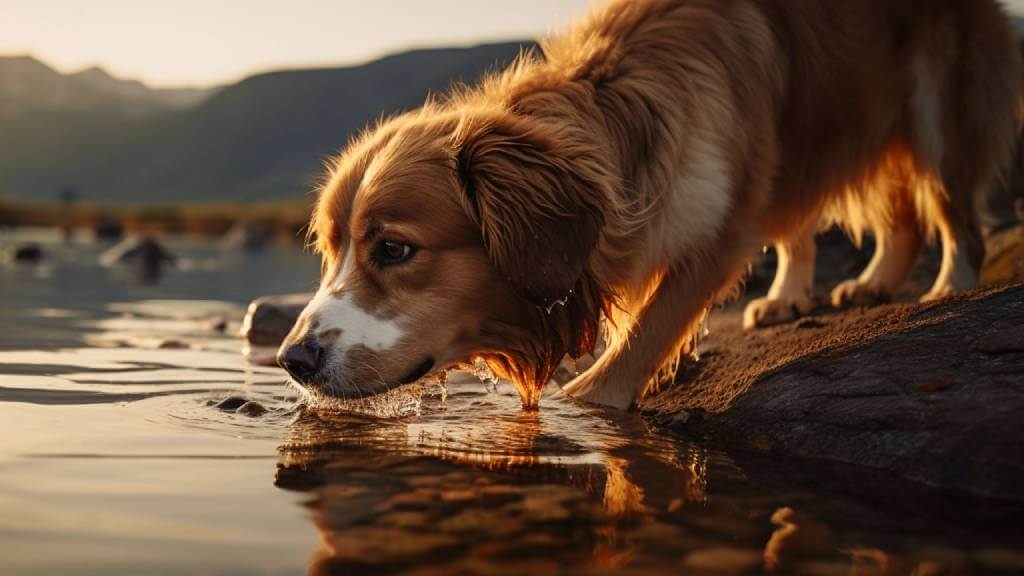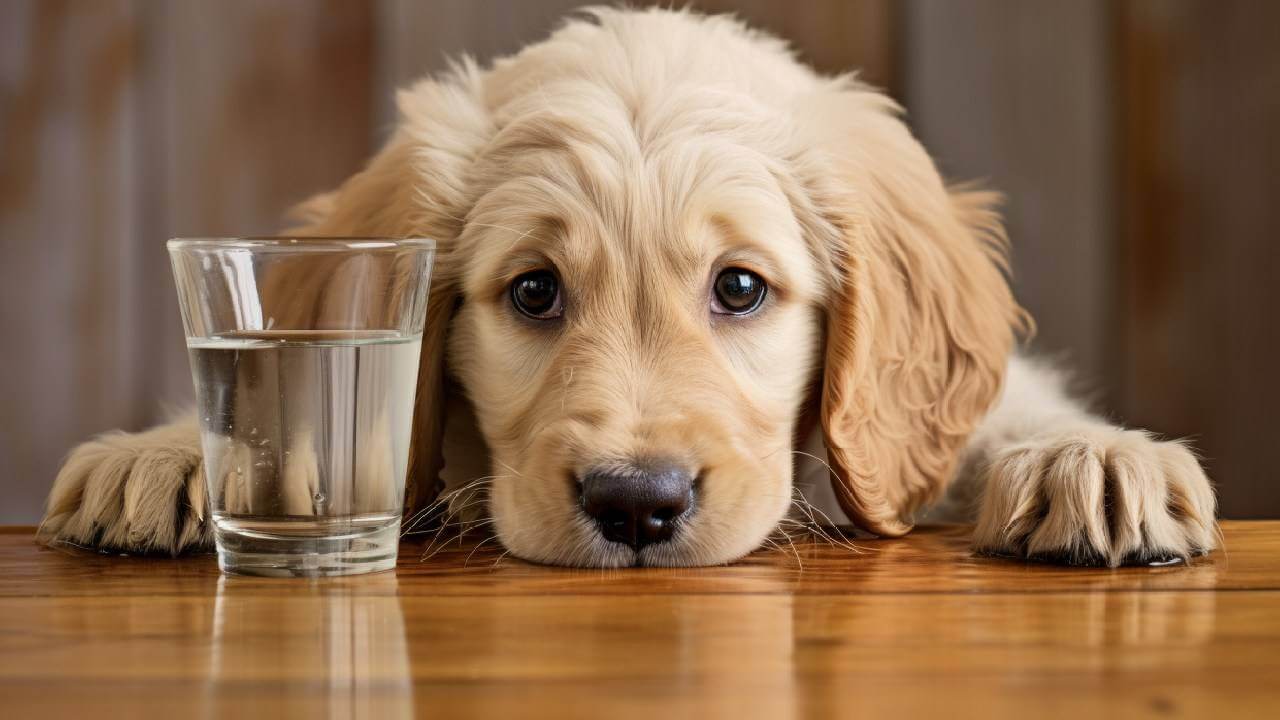In the world of canine health, few concerns are as pervasive and potentially dangerous as dehydration. Often overlooked or underestimated, dehydration can quietly creep into a dog’s life, posing serious risks to their well-being.
Just as water is vital for sustaining life, its absence can lead to a cascade of health complications that affect both the body and mind of our beloved furry companions.
In this article, we embark on a journey to uncover the hidden dangers of dog dehydration, shedding light on why it’s imperative to recognize its symptoms, causes, and treatment options.
Causes of Dog Dehydration
Dehydration in dogs often arises from a complex interplay of various factors. To truly understand and address dehydration, we must investigate the underlying causes that can trigger this condition.
1. Inadequate Water Intake: At the heart of the matter lies the most obvious culprit: inadequate water intake. Just as humans need regular hydration, dogs rely on a consistent fresh water supply to maintain their bodily functions.
If a dog doesn’t consume enough water due to accessibility issues or personal preference, their body’s fluid balance can be disrupted, leading to dehydration.
2. Heat and Humidity: Dogs don’t sweat like humans; they primarily regulate their body temperature through panting. When exposed to excessive heat and humidity, dogs can lose water rapidly through panting, leading to dehydration.
3. Illnesses and Medical Conditions: Underlying illnesses can contribute to dog dehydration. Conditions such as kidney disease, diabetes, and gastrointestinal issues can lead to increased fluid loss through vomiting, diarrhea, or increased urination.
4. Physical Activity and Exertion: Dogs can become dehydrated after intense physical activity, such as a rigorous play session, a long hike, or a game of fetch. Providing water breaks during and after physical activity is essential to replenish lost fluids.
5. Gastrointestinal Issues, Including Worms: Worms in dogs have a twofold effect on a dog’s hydration. First, they can directly cause fluid loss due to the symptoms they induce. Second, their presence can deter a dog from eating and drinking properly, exacerbating the risk of dehydration.

Signs And Symptoms of Dehydration in Dogs
Recognizing the signs of dehydration in dogs is akin to deciphering a secret language. Dogs, being masters of non-verbal communication, often convey their discomfort through subtle cues that might go unnoticed by an untrained eye.
- Dry Gums and Sticky Saliva: A dog’s gums are an excellent indicator of their hydration status. In a hydrated dog, gums are moist and slick. However, if you notice their gums appearing dry and tacky to the touch, it’s a potential sign of dehydration.
- Loss of Skin Elasticity: Gently pinch a fold of skin on your dog’s neck or back. In a well-hydrated dog, the skin should spring back immediately. If the skin takes longer to return to its normal position or forms a “tent,” it could indicate dehydration.
- Reduced Urination: Monitoring your dog’s urination patterns can offer insights into its hydration level. If you observe that your dog is urinating less frequently or that its urine appears darker and more concentrated, it’s a sign that its body is conserving water.
- Loss of Appetite: Dehydrated dogs may experience a reduced appetite. If your dog is not interested in food or treats, it could be a sign that they are not feeling well.
- Dry Nose in Dog: Contrary to popular belief, a dry nose alone is not a reliable indicator of dehydration. However, when observed alongside other symptoms, a consistently dry nose could contribute to the overall picture of dehydration.
Preventing Canine Dehydration
Ensuring your dog stays hydrated is crucial for their overall health and well-being. Dehydration in dogs can lead to serious health issues, so proactive measures are essential.
Always provide fresh, clean water, and refill their water bowl regularly. When outdoors, especially during hot weather or vigorous exercise, carry a portable water bottle or bowl for your dog.
Monitor your dog’s water intake; a noticeable decrease could indicate underlying health problems. In addition to water, wet food can help maintain hydration levels.
Pay extra attention to hydration if your dog is sick, as illnesses can increase the risk of dehydration. Recognizing the signs of dehydration, such as dog lethargy, dry gums, and excessive panting, is vital. In such cases, consult your veterinarian immediately. Remember, consistent access to water and understanding your dog’s specific needs are key to preventing dehydration and ensuring their health and happiness.

Treating Dog Dehydration
Rehydration solutions can restore electrolyte balance in moderate to severe dehydration cases. These solutions are formulated to contain the right combination of fluids and electrolytes that mimic a dog’s body composition. Commercially available rehydration solutions or those your veterinarian recommends can be valuable tools in the recovery process.
- Monitoring and Supervision. Monitor and supervise your dog’s water intake, urine output, and overall behavior. If you notice any worsening symptoms or lack of improvement, consult your veterinarian promptly.
- Adjusting Diet and Nutrition. Wet dog food or adding water to dry kibble can contribute to their overall fluid intake. Additionally, foods with high water content, such as fruits like watermelon or cucumber, can be offered as treats.
- Seeking Veterinary Care. Your veterinarian can thoroughly examine the patient, determine the cause of dehydration, and recommend appropriate treatment. In severe cases, intravenous (IV) fluids might be necessary to restore hydration rapidly.
Dog dehydration is not to be underestimated; it’s a subtle yet significant concern that can have far-reaching consequences. As responsible pet owners, we hold a sacred duty to provide for our dogs’ physical and emotional needs. Nurturing hydration requires more than just offering a bowl of water; it’s about understanding their cues, recognizing the signs, and responding with care.

FAQs
Can my dog get dehydrated even in cooler weather?
Dogs can also become dehydrated in cooler weather. Cold temperatures cause them to conserve water through panting and increased metabolism. Always ensure your dog has access to water, regardless of the season.
Can certain breeds be more prone to dehydration?
Certain breeds with short noses (brachycephalic breeds), like Bulldogs and Pugs, are more susceptible due to their limited ability to cool down through panting. Additionally, working breeds that engage in intense physical activity might be at a higher risk.
Is it possible for my dog to drink too much water?
While excessive water consumption can be a concern in rare cases, especially in certain medical conditions, most dogs self-regulate their water intake. Monitor their habits and consult a veterinarian if you notice drastic changes.
Can I use sports drinks or flavored water for rehydration?
It’s best to avoid using sports drinks or flavored water for rehydrating your dog. Stick to clean, plain water or veterinarian-recommended rehydration solutions to ensure their electrolyte balance is maintained correctly.
Can homemade rehydration solutions be effective for mild dehydration?
Homemade rehydration solutions, like diluting chicken broth with water, can be used for mild cases of dehydration. However, consult your veterinarian before trying any homemade solutions to ensure they are safe and appropriate for your dog.






Dehydration is no joke, especially in hot weather. My dog, Luna, had a scare last year. Any tips for keeping dogs hydrated, especially during summer months? 💧🐕
Dehydration in dogs is a serious issue. Your article provided helpful tips on preventing it
Are there any signs of dehydration that are often overlooked?